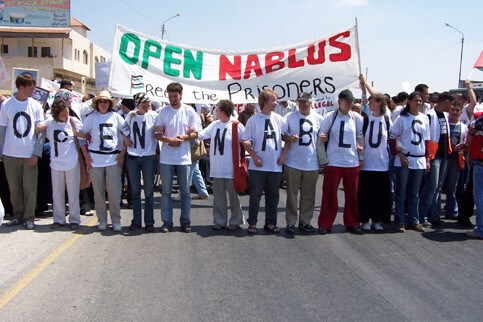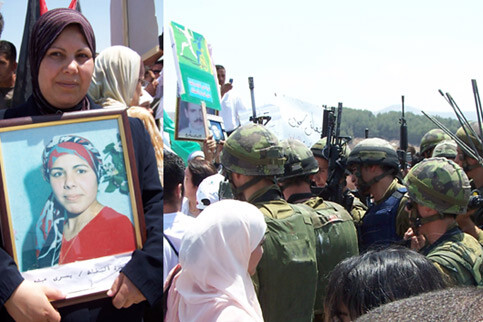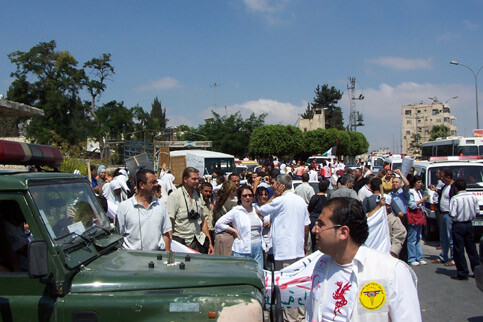International Solidarity Movement 25 July 2005

In the high point of a week of planned non-violent direct actions against the occupation, residents of Nablus converged on Huwara checkpoint to protest the continuing closure of the region. Prisoners’ families, accompanied by more than thirty international activists, were flanked by Palestinian medics and ambulances as they approached the checkpoint. The two aims of the action were to raise the profile of the Palestinian prisoners in Israeli gaols and to protest the ongoing closure of the Nablus area.
There are currently 8000 Palestinians, many of whom are women and children, illegitimately imprisoned by Israel. Currently 1400 of the prisoners are from Nablus. The town is surrounded by checkpoints, of which four are currently active. Nablus was entirely closed for much of the time from the start of the last intifada to this year’s elections.
Nablus city is still frequently subject to closure and often inaccessible for the residents of surrounding villages who are dependent on services in the town. International visitors are routinely denied access at Huwara and Beit Iba checkpoints. Some 318 000 people in the governorate live with severe restrictions imposed on their movement by a system of fixed and part time checkpoints, road blocks and trenches flooded by settlement sewage.
Armed teenagers from the Israeli occupation forces can arbitrarily detain any Palestinian on the road or deny them passage altogether. UN OCHA documents the instances of delays to ambulance at checkpoints each week. Published figures count the deaths at checkpoints and the number of babies born to women refused permission to cross to reach the hospital. Delays contribute to the deterioration in health or death of further numbers of people. Ambulance drivers have been beaten and paramedics have been made to strip for the soldiers before being allowed to pass or turned away. Medics, who must suffer the oppression and humiliation of the checkpoint several times daily, made up a large number of the participants today.
Residents began their rally at Nablus’s bombed-out Muqata (government office). The buildings were largely destroyed in the April 2002 invasion and the remaining structures bear heavy damage from the shelling. Four buses and eight ambulances took the demonstrators towards the checkpoint.

Prisoners’ families joined the action, bringing photographs of their gaoled relatives. They chose to make their protest at Huwara as the Israeli authorities prohibit them from visiting their relatives in prison. Palestinians are often initially detained at Huwara military base before being transferred to prisons in Israel. There are three main Israeli military bases surrounding Nablus city, with additional outposts on the hilltops around the town and region.
Internationals from peace and solidarity groups dressed in white, some spelling out the words “OPEN NABLUS”, others carrying banners calling for freedom and justice for all Palestinians. In a colourful and lively march the group approached the checkpoint. Everyone joined together in chanting slogans in Arabic and English, “Belroah, bedam, nafdeeke ya aseer / falasteen! ” (with our soul, with our blood, we will struggle for the prisoners / Palestine ), “No Justice, No Peace!”, “Open Nablus, Free the Prisoners!”.
Soldiers ran to take up positions around the group and brought jeeps to push everyone back. Internationals sat on the floor to resist this and found strong Palestinian women stepping over them to get to the front line. The Palestinian spokespeople were able to meet their aim of reading a letter for the press condemning the closure and calling for the release of the prisoners.

This was the first demonstration at the checkpoint in a year. The Palestinian organizers are proud that it passed successfully without arrests or injuries. They intend to begin a regular campaign of similar acts of resistance. International activists can join them in their call for freedom for Palestinians.
In other actions this week the army prevented internationals and Israeli activists joining the villagers of Asira to march to Nablus on the Sabaatash road, which has been closed by road blocks since the start of the intifada. Residents are forced to climb around and walk a few miles or take a long and expensive route around to Beit Iba checkpoint, where they may be denied entry altogether.
Two months ago internationals and villagers had a demonstration and removed the roadblocks. Within an hour the army had come and dug up the road, creating ditches and earth mounds 3m high. They then maintained a presence in the area, shooting at anyone who tried to cross. This was at a time when they had agreed to open up such roads. In fact the checkpoint to the neighbouring village, Al Bidhan, was removed altogether so it was possible to drive to Nablus via that village without crossing a roadblock or checkpoint.
The Sabaatash roadblocks only serve to force the villagers to take a longer and more expensive route into town and to isolate one household from the village. The demonstration on Friday was to walk the route with villagers to begin to reclaim the road. Israeli activists were detained as the approached by another road. Internationals walking on Sabaatash were met by soldiers who had been waiting hiding in caves in the hillside.
Meanwhile the 200 hundred Palestinians who intended to participate in the march had been detained. Soldiers had opened live fire into the group causing shrapnel injuries and confiscated the keys to the ambulance before checking everyone’s IDs. It is not clear why such a march would warrant such a large scale military operation. The aim was to walk the closed route from the village to the town in the centre of the West Bank of Palestine , far from Israeli towns.
As villagers point out, the two longer routes to Nablus are open and until two months ago they were able to walk Sabaatash. Closures were supposed to have been lifted in that time, not increased. The Israeli army was determined not just to stop the march leaving the village but to stop international and Israelis even reaching village. It seems that they did not want International and Israeli witnesses on the scene in order for them to abuse the Palestinians with impunity.
Witnesses do not necessarily curb army abuses. Last week, 18th July, an international visitor tried to cross the part time checkpoint to Salem village. The cars had been held up for some time and eventually one man got out of his car to ask the soldiers of he could jump the queue as he was bringing his wife and newborn back from the hospital. Their response was to shoot him in the leg. The international observer approached to soldiers to demand an explanation but was met with laughter and denials, “What man? We didn’t shoot anyone”.
Yesterday international and Israeli activists successfully accompanied a resident of Salem to work on his land that has been isolated from the village by a settler road. Deterred by the shooting and a recent settler attack to cut down olive trees, other villagers decided to stay away. Salem is a farming village, population 5000, to the east of Nablus.
Since the start of this intifada Salem and its neighbouring villages Asmut and Deir Al Hatab have been closed from Nablus town to the west and Beit Furik to the southeast by ditches several kilometers in length, at points 3metres deep and 5metres wide. Elon More settlement has confiscated much of the land belonging to these farming villages.
The land still nominally belonging to the Palestinians is subject to severe restrictions by the Israeli army, who only allow the people to work their land on a few specified days. Earlier this year a further 85 dunums of land was taken from Deir Al Hatab, which has now lost all of its land up to 30m from the last house.
Officially Israel says the land is taken for “security of the military base” rather than settlement expansion but the base is only there for the expanding settlement. Elon More settlers have a history of making violent attacks on Palestinians. In April this year a group of 40 Elon More settlers were rounded up by soldiers in Al Bidan Valley. Another group recently completely destroyed a large area of olive grove by burning the trees.